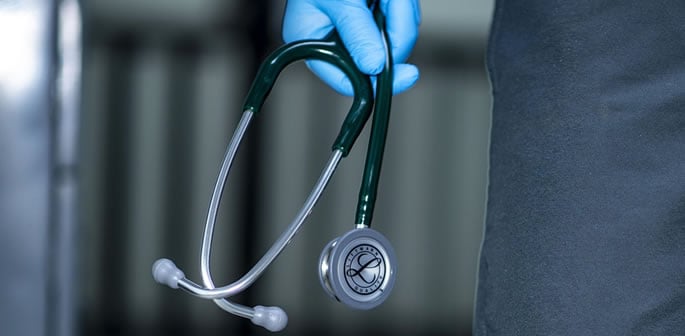"This tool could be a real game-changer for patients"
Researchers have found that a stethoscope powered by artificial intelligence (AI) could transform heart care by spotting serious conditions within seconds.
The trial, involving more than 200 GP surgeries in London, tested the devices which build on the traditional stethoscope invented in 1816.
Researchers say the tool has been “upgraded for the 21st century”.
The AI stethoscope could be a “real game-changer”, allowing earlier treatment for patients with heart failure, heart valve disease, and abnormal heart rhythms, also known as atrial fibrillation.
Heart failure was 2.3 times more likely to be detected in patients using the new stethoscope over 12 months compared to those without it.
Abnormal heartbeat patterns, often symptomless but a major stroke risk, were 3.5 times more detectable.
Heart valve disease was 1.9 times more detectable.
The device is placed on the chest like a playing card-sized monitor.
It records an electrocardiogram (ECG) to measure heart signals while a microphone tracks blood flow. The data is then sent to the cloud where AI, trained on tens of thousands of patient records, analyses it for signs of disease.
The study, led by Imperial College London and Imperial College Healthcare NHS Trust, could be expanded to south London, Sussex, and Wales.
Professor Mike Lewis, scientific director for innovation at the National Institute for Health and Care Research, said:
“This tool could be a real game-changer for patients, bringing innovation directly into the hands of GPs.
“The AI stethoscope gives local clinicians the ability to spot problems earlier, diagnose patients in the community, and address some of the big killers in society.”
The trial compared 12,725 patients across GP surgeries. Ninety-six practices used the AI stethoscopes, while 109 did not.
Participants showed symptoms such as fatigue, breathlessness, or swelling in the legs or feet, which are all linked to heart failure.
Dr Sonya Babu-Narayan, clinical director at the British Heart Foundation and consultant cardiologist, said:
“This is an elegant example of how the humble stethoscope, invented more than 200 years ago, can be upgraded for the 21st century.
“We need innovations like these, because so often this condition is only diagnosed at an advanced stage when patients attend hospital as an emergency.
“Given an earlier diagnosis, people can access the treatment they need to help them live well for longer.”






























































